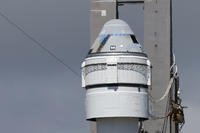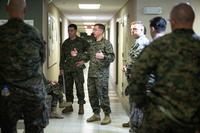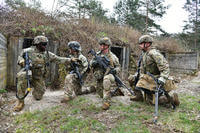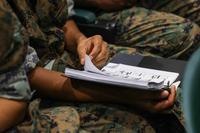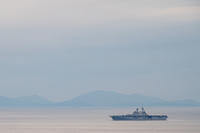The head of Pacific Command on Tuesday said the rebalance of U.S. forces to the Asia-Pacific region remained on course despite the growing demand for U.S. troops and assets to counter escalating threats in Europe and the Mideast.
"The military piece of it is moving forward,” Adm. Samuel Locklear said of the so-called “Pacific pivot” that has been a centerpiece of the Obama administration’s strategy. “I don’t get a sense that we’re backing away” from the commitment to the rebalance, Locklear said at a Pentagon briefing.
It was the second consecutive day in which a top Navy official defended the rebalance that has come into question amid the emerging and potentially long-term crises in Eastern Europe, the Mideast and northern Africa.
On Monday at the Yokosuka Naval Base in Japan, Navy Secretary Ray Mabus told sailors, “The rebalance to the Pacific is real.”
The $3.3 billion stealth destroyer Zumwalt (DDG-1000) that has mostly finished construction and two others on the drawing boards were under consideration for posting to the Pacific, Mabus said.
“We don’t know exactly where we are going to put them,” he said, but the Pacific was a likely choice.
At the Pentagon, Locklear said he backed the push by Air Force Gen. Philip Breedlove, who doubles as European Command chief and Supreme Commander of NATO, to bolster U.S. forces in Europe to counter the Russian threat against Ukraine and NATO allies in Eastern Europe.
The admiral said he agreed with the general that the U.S. needs to re-consider its force posture in Europe, but Locklear said Breedlove’s needs should not detract from his own in the Pacific.
“I don’t think along those terms,” Locklear said. In addition, “our forces are globally deployable no matter where they’re stationed,” he said.
On other issues, Locklear said he found it “a little odd” that China sent an intelligence ship to spy on the RIMPAC (Rim of the Pacific) exercises off Hawaii in which four of its own ships were participating. He said the presence of the spy ship “hasn’t created any difficulties in the exercise” which was ending Friday.
Continuing tensions between allies South Korea and Japan on a range of issues could affect their mutual defense, Locklear said, particularly in the areas of ballistic missile and air defense systems.
Failures by South Korea and Japan to communicate with each other could “degrade their ability to defend their own airspace” and “it must be recognized that they are in an impediment to their security,” he said.
North Korea remained a major concern, Locklear said. The desire of the North Koreans to develop nuclear warheads for their ballistic missiles was “highly threatening to the global security environment,” he said.

